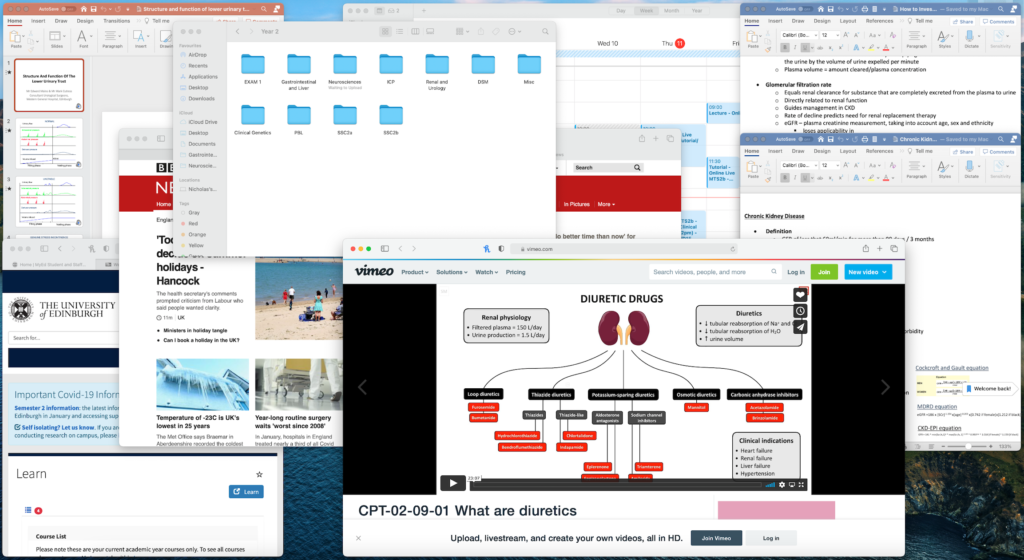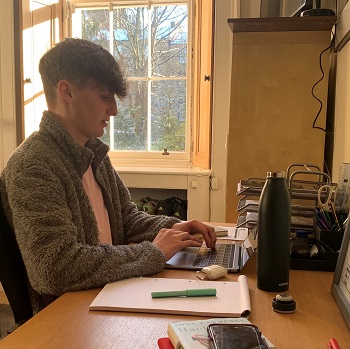
Hi, I’m Nicholas Moore, a 2nd year medical student at the University of Edinburgh. As part of our SSC2b project, we are writing a series of blogs focusing on different themes, one of which being online learning.
If the last year has taught me anything, it is that we now rely on technology more than anything else. A recent power cut in Edinburgh proved this more than anything else – in the world of working from home, no electricity and no internet is the perfect mix to bring life to a halt. Thankfully, we had power back by Monday morning so there was no excuse to keep the laptop closed (phew?)!
The ups and downs
Over the last year, online learning has provided a flexible and versatile alternative to typical university scheduling; however, like everything, I have found it has some ups and downs. The COVID-19 pandemic cut my first year of medical school short and caused significant disruption to our learning. Luckily, as the medical school has previous experience of delivering courses online, we quickly adapted and after a week, all lecture and tutorial material was delivered online. Since last March, I have been able to adapt to this quite well and find out what works best for me.

Coming to university is already such a massive change from secondary school. Learning becomes a lot more self-directed and there is a lot more of an onus on you to make sure you turn up to all your classes (especially when your mum isn’t dragging you out of bed every morning!). One benefit to learning online is that it cuts out travel – I know I’m not the only person who isn’t missing 9am starts at the Royal Infirmary! This gives me a lot more flexibility of a morning, since my commute is now only 5 steps rather than 1000.
To the same effect, asynchronous online lectures (which is just a fancy way of saying “at your own pace”) let you work when it suits you and let you work them around your daily activities. For me, the hustle and bustle of the day is a bit too much for my short attention span, meaning I tend to sit down at night when distractions are at a minimum.
The etiquette of online group tutorials
Online group tutorials present their own challenges, but after a while, you tend to grasp the ‘etiquette’. Something I have grown quite used to is speaking at the same time as someone and then the customary “you go”, “no you go”, “no you go first” ensues. I suppose I could avoid this by ‘raising my virtual hand’, but sometimes what you have to say just can’t wait.
Another marvel of video calling is being able to read everyone’s room. Some people have quite clearly just woken up and picked up their laptop from beside the bed where they left it at 3am last night when they decided they didn’t need to watch that fourth episode of the night (wouldn’t be me), others have seemingly been up since 6am, been for a run, ate their avocado on toast for breakfast, had a shower, revised all of the previous weeks lectures and joined the call from their desks, where they have been perched for the last hour. Essentially everyone falls somewhere between those two extremes…
Seeing patients via a screen
Unfortunately, many practical sessions have had to be cancelled, and this teaching has been delayed until 4th year when we get on the wards; however, thanks to the wonders of technology, the clinical skills and ICP (Introduction to Clinical Practice) teams were able to provide interactive sessions online. After taken dozens of patient histories through a laptop screen, I can appreciate the struggles GPs must be going through now, since the majority of consultations are over the phone.
Hopefully as restrictions ease, we will be able to get some face to face practice without relying on BT as a middleman! As for clinical skills, face to face teaching can’t resume quick enough – doing a perianal swab on a video call isn’t quite the same!
Overall, I appreciate the struggles of coordinating a degree through the internet and so far it has been managed quite well. I also appreciate that the experience depends on the student, as I know everyone has dealt with the situation in their own way.
I’ll leave you with a few of my ‘top’ tips for online learning:
- Plan out your week in advance – get a diary or a handy whiteboard to keep track of everything
- Make lists of everything you need to get done in a day and check them off as they are complete for some self-affirmation
- Invest in a do not disturb sign for your door – avoids that awkward signalling to your flatmate or parents to get out
- Remember to unmute when you want to speak – it saves me from the second-hand embarrassment of you having to explain something twice because the first time your mic was muted
- Mute after you speak – nothings more embarrassing than playing a TikTok out loud through your mic
- Learn how you learn – online learning is very flexible, find out what works best for you and stick with it.




